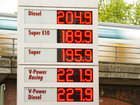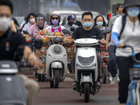It's not a summer heat wave that's making European leaders and businesses sweat. It's fear that Russia's manipulation of natural gas supplies will lead to an economic and political crisis next winter. Or, in the worst case, even sooner.
Here are key things to know about the energy pressure game over the war in Ukraine:
 Full Story
Full Story
A delegation of Egyptian business leaders was in Israel on Monday, the first such visit in a decade, in a sign of "warming" ties between the two countries, Israeli officials said.
 Full Story
Full Story
Dubai's vast Expo 2020 site is to reopen as Expo City Dubai, a "city of the future" with housing, businesses and leisure facilities, officials said on Monday.
 Full Story
Full Story
China ramped up crude oil imports from Russia in May, customs data showed Monday, helping to offset losses from Western nations scaling back Russian energy purchases over the invasion of Ukraine.
 Full Story
Full Story
Unions and train companies in Britain are set to hold last-minute talks Monday amid fading hopes of averting the country's biggest rail strikes for decades.
Up to 40,000 cleaners, signalers, maintenance workers and station staff are due to walk out for three days this week, on Tuesday, Thursday and Saturday, in a dispute over pay and job security at a time of soaring inflation.
 Full Story
Full Story
Weeks of negotiations on safe corridors to get grain out of Ukraine's Black Sea ports have made little progress, with urgency rising as the summer harvest season arrives.
Countries like Lebanon, Somalia, Libya, Egypt and Sudan are heavily reliant on wheat, corn and sunflower oil from Ukraine and Russia.
 Full Story
Full Story
At a gas station near the Cologne, Germany, airport, Bernd Mueller watches the digits quickly climb on the pump: 22 euros ($23), 23 euros, 24 euros. The numbers showing how much gasoline he's getting rise, too. But much more slowly. Painfully slowly.
"I'm getting rid of my car this October, November," said Mueller, 80. "I'm retired, and then there's gas and all that. At some point, you've got to scale back."
 Full Story
Full Story
Germany will take emergency measures to ensure it meets its energy needs after the drop in supply of Russian gas, including increased use of coal, the government said Sunday.
 Full Story
Full Story
The Universal Postal Union has published on its website a LibanPost statement about the company’s efforts to achieve the U.N.’s Sustainable Development Goal 8 (Decent Work and Economic Growth).
Below is the statement’s full text as published by UPU:
 Full Story
Full Story
China on Friday defended its tough "zero-COVID" policy after the U.S. ambassador said it was causing serious damage to the global economy and foreign business sentiment.
Foreign Ministry spokesperson Wang Wenbin said the Chinese economy is recovering from the effects of the pandemic and "facts prove" the policy mandating lockdowns, quarantines and mass testing is "suitable for China's national conditions and has stood the test of history."
 Full Story
Full Story



